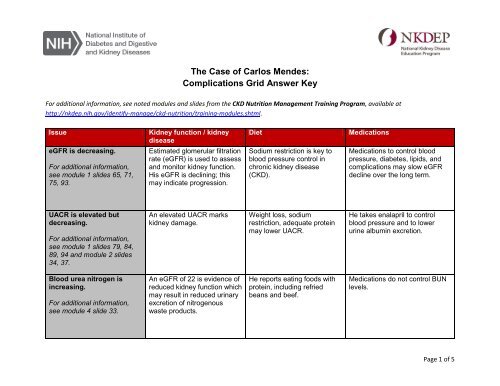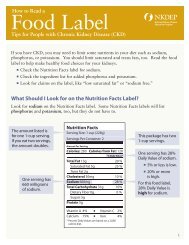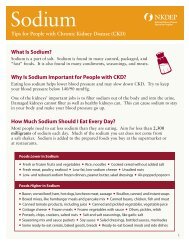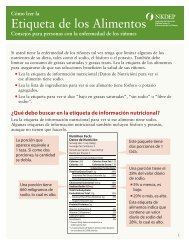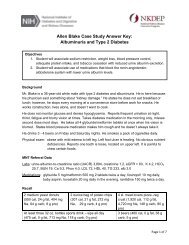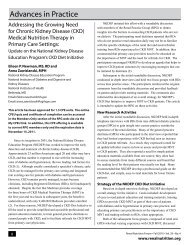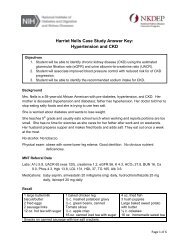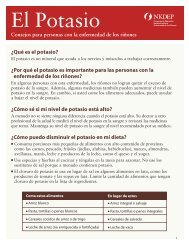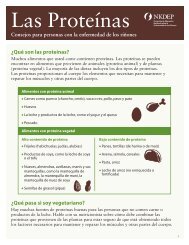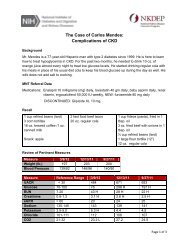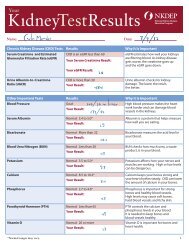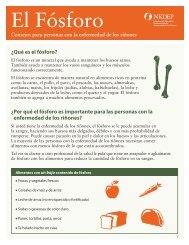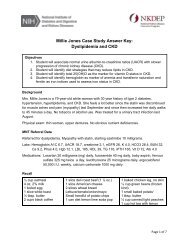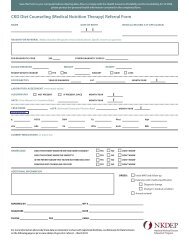Complications Grid Answer Key - National Kidney Disease ...
Complications Grid Answer Key - National Kidney Disease ...
Complications Grid Answer Key - National Kidney Disease ...
Create successful ePaper yourself
Turn your PDF publications into a flip-book with our unique Google optimized e-Paper software.
The Case of Carlos Mendes:<br />
<strong>Complications</strong> <strong>Grid</strong> <strong>Answer</strong> <strong>Key</strong><br />
For additional information, see noted modules and slides from the CKD Nutrition Management Training Program, available at<br />
http://nkdep.nih.gov/identify-manage/ckd-nutrition/training-modules.shtml.<br />
Issue<br />
<strong>Kidney</strong> function / kidney<br />
disease<br />
Diet<br />
Medications<br />
eGFR is decreasing.<br />
For additional information,<br />
see module 1 slides 65, 71,<br />
75, 93.<br />
Estimated glomerular filtration<br />
rate (eGFR) is used to assess<br />
and monitor kidney function.<br />
His eGFR is declining; this<br />
may indicate progression.<br />
Sodium restriction is key to<br />
blood pressure control in<br />
chronic kidney disease<br />
(CKD).<br />
Medications to control blood<br />
pressure, diabetes, lipids, and<br />
complications may slow eGFR<br />
decline over the long term.<br />
UACR is elevated but<br />
decreasing.<br />
For additional information,<br />
see module 1 slides 79, 84,<br />
89, 94 and module 2 slides<br />
34, 37.<br />
An elevated UACR marks<br />
kidney damage.<br />
Weight loss, sodium<br />
restriction, adequate protein<br />
may lower UACR.<br />
He takes enalapril to control<br />
blood pressure and to lower<br />
urine albumin excretion.<br />
Blood urea nitrogen is<br />
increasing.<br />
For additional information,<br />
see module 4 slide 33.<br />
An eGFR of 22 is evidence of<br />
reduced kidney function which<br />
may result in reduced urinary<br />
excretion of nitrogenous<br />
waste products.<br />
He reports eating foods with<br />
protein, including refried<br />
beans and beef.<br />
Medications do not control BUN<br />
levels.<br />
Page 1 of 5
Issue<br />
Serum potassium is<br />
elevated.<br />
For additional information,<br />
see module 1 slides 34-38;<br />
module 2 slides 80, 81;<br />
module 3 slides 47-53; and<br />
module 5 slides 38, 44, 49,<br />
53, 67.<br />
<strong>Kidney</strong> function / kidney<br />
disease<br />
An eGFR of 22 is evidence of<br />
reduced kidney function which<br />
may result in reduced urinary<br />
excretion of potassium. His<br />
serum bicarbonate level is low<br />
and this may drive potassium<br />
out of the cells and into the<br />
extracellular compartment.<br />
Diet<br />
He is drinking more orange<br />
juice to treat hypoglycemia<br />
and has potassium-rich foods<br />
such as refried beans and<br />
coffee.<br />
Potassium restriction is<br />
indicated.<br />
Medications<br />
He takes enalapril which lowers<br />
potassium excretion; he will start<br />
furosemide which increases<br />
potassium excretion. Treating<br />
acidemia may reduce potassium;<br />
his bicarbonate level is low.<br />
Treating hyperglycemia with<br />
insulin may lower potassium, he<br />
is not hyperglycemic.<br />
Serum bicarbonate is low.<br />
For additional information,<br />
see module 3 slides 76, 79-<br />
82, 87.<br />
Reduced bicarbonate<br />
synthesis by the kidneys and<br />
reduced urinary excretion of<br />
hydrogen ion (acid) may lead<br />
to lower serum bicarbonate<br />
levels in CKD.<br />
He reports he still eats meat<br />
which is a source of metabolic<br />
acid. Reducing dietary<br />
protein may increase serum<br />
bicarbonate levels.<br />
If level remains low, the<br />
physician may prescribe<br />
supplemental base such as<br />
sodium bicarbonate.<br />
Serum calcium is low.<br />
Corrected calcium = serum<br />
calcium + [0.8 (4.0 – serum<br />
albumin)]<br />
Corrected Ca = 9.6<br />
For additional information,<br />
see module 3 slides 87, 88,<br />
97, 101, 102, 110, 114.<br />
Abnormal metabolism of<br />
calcium may develop in CKD<br />
due to inadequate activation<br />
of vitamin D by the kidneys.<br />
This may result in reduced<br />
calcium absorption and<br />
hypocalcemia. Parathyroid<br />
hormone controls serum<br />
calcium; levels may be<br />
impacted in CKD.<br />
Intake is low, and calcium-rich<br />
foods do not control serum<br />
calcium<br />
Use of supplemental Vitamin D<br />
with calcium-based phosphate<br />
binders may increase serum<br />
calcium in CKD.<br />
Page 2 of 5
Issue<br />
<strong>Kidney</strong> function / kidney<br />
disease<br />
Diet<br />
Medications<br />
Serum phosphorus is<br />
within range.<br />
For additional information,<br />
see module 3 slides 87, 98,<br />
100, 101, 105-107, 110, 114.<br />
Abnormal metabolism of<br />
phosphorus may develop in<br />
CKD due to a variety of<br />
factors. Fibroblastic growth<br />
factor-23 controls serum<br />
levels. Parathyroid hormone<br />
increases urinary phosphorus<br />
excretion; as a result serum<br />
phosphorus levels may be<br />
within range until eGFR is<br />
very low.<br />
He eats refried beans, meat<br />
and drinks colas. Absorption<br />
of phosphorus varies by<br />
dietary source. Phytates<br />
reduces absorption, not all is<br />
absorbed from animal<br />
proteins, and food additives<br />
are absorbed more readily.<br />
Phosphate-binding medications<br />
may be prescribed, and may<br />
include calcium supplements.<br />
Vitamin D supplements increase<br />
risk of hyperphosphatemia, as<br />
vitamin D enhances both calcium<br />
and phosphorus absorption.<br />
Serum albumin is low.<br />
For additional information,<br />
see module 3 slides 64, 67,<br />
68, 84.<br />
Albumin is normally<br />
reabsorbed within the tubules.<br />
His urine-albumin-tocreatinine<br />
ratio is elevated<br />
indicating kidney damage and<br />
some loss of albumin into the<br />
urine.<br />
He reports he still eats<br />
protein-rich foods and had<br />
more calories from orange<br />
juice and regular pop.<br />
Angiotensin converting enzyme<br />
inhibitors or angiotensin receptor<br />
blockers used to reduce urine<br />
albumin may impact serum<br />
albumin levels to some degree.<br />
Treating metabolic acidosis (<br />
evidenced by low serum<br />
bicarbonate) with supplemental<br />
base may increase albumin.<br />
Treating infections may reduce<br />
inflammation and improve<br />
albumin.<br />
LDL cholesterol is elevated.<br />
For additional information,<br />
see module 2 slides 107, 109,<br />
111, 116, 117.<br />
Reduced kidney function may<br />
contribute to accumulation of<br />
pro-inflammatory cytokines<br />
and increased inflammation.<br />
LDL particles may be smaller<br />
and denser, and more prone<br />
to oxidation and accumulation<br />
in vessel walls.<br />
He eats fast foods and foods<br />
fried in lard. His intake<br />
includes foods with soluble<br />
fiber that contain potassium.<br />
He takes lovastatin to control<br />
LDL cholesterol.<br />
Page 3 of 5
Issue<br />
<strong>Kidney</strong> function / kidney<br />
disease<br />
Diet<br />
Medications<br />
25(OH) vitamin D was low<br />
and is increasing.<br />
For additional information,<br />
see module 3 slides 94-96<br />
101, 114.<br />
The kidneys produce the 1–<br />
alpha hydroxylase enzyme<br />
that changes 25 hydroxy<br />
vitamin D to 1,25 dihydroxy<br />
vitamin D, the active form.<br />
Inadequate levels of vitamin D<br />
and reduced kidney function<br />
may result in abnormal<br />
mineral metabolism and bone<br />
disease in CKD.<br />
His diet as recalled does not<br />
contain significant amounts of<br />
vitamin D.<br />
He takes a vitamin D supplement<br />
which may increase calcium and<br />
phosphorus absorption; his<br />
serum levels are increasing.<br />
Parathyroid hormone (PTH)<br />
level is within range.<br />
For additional information,<br />
see module 3 slides 97-99,<br />
101.<br />
PTH increases calcium<br />
reabsorption and increases<br />
phosphorus excretion in the<br />
kidney.<br />
There are no dietary sources.<br />
Hypocalcemia may stimulate<br />
secretion.<br />
Vitamin D supplements may<br />
reduce PTH levels in CKD.<br />
A1C decreased from 11.4 to<br />
6.6, and more frequent<br />
hypoglycemia.<br />
For additional information,<br />
see module 2 slides 64-67,<br />
78-81.<br />
The kidneys metabolize<br />
insulin and many medications.<br />
Hypoglycemia may warrant a<br />
change in diabetes<br />
medications.<br />
He has increased intake of<br />
carbohydrates, including<br />
orange juice and regular colas<br />
to treat and prevent<br />
hypoglycemia.<br />
Glipizide XL, a medication that<br />
stimulates insulin secretion, has<br />
been discontinued to prevent<br />
hypoglycemia. An improvement<br />
in diabetes control without a<br />
change in therapy may indicate<br />
CKD progression.<br />
Page 4 of 5
Issue<br />
<strong>Kidney</strong> function / kidney<br />
disease<br />
Diet<br />
Medications<br />
Hemoglobin level is lower<br />
than normal for a man.<br />
For additional information,<br />
see module 3 slides 14, 15,<br />
22, 26-34.<br />
The kidneys produce<br />
erythropoietin needed for red<br />
blood cell synthesis. Anemia<br />
may develop earlier in people<br />
with diabetes. Hepcidin, the<br />
hormone that regulates iron<br />
absorption, may accumulate<br />
in CKD and reduce iron<br />
absorption.<br />
He reports he is still eating<br />
meat. He is not taking<br />
supplemental iron.<br />
Oral iron supplements may be<br />
prescribed. Parenteral iron is<br />
used infrequently due to<br />
potential damage to kidney<br />
tubules. An injectable<br />
erythropoiesis-stimulating agent<br />
may be used; people must be<br />
advised of adverse risks<br />
associated with its use - stroke,<br />
hypertension and loss of<br />
vascular access.<br />
For more information, visit www.nkdep.nih.gov/nutrition or call 1-866-4 KIDNEY (1-866-454-3639).<br />
The <strong>National</strong> <strong>Kidney</strong> <strong>Disease</strong> Education Program (NKDEP) works to improve the understanding, detection, and management of kidney disease.<br />
NKDEP is a program of the <strong>National</strong> Institutes of Health (NIH). NKDEP is a program of the <strong>National</strong> Institutes of Health.<br />
April 2013<br />
Page 5 of 5


